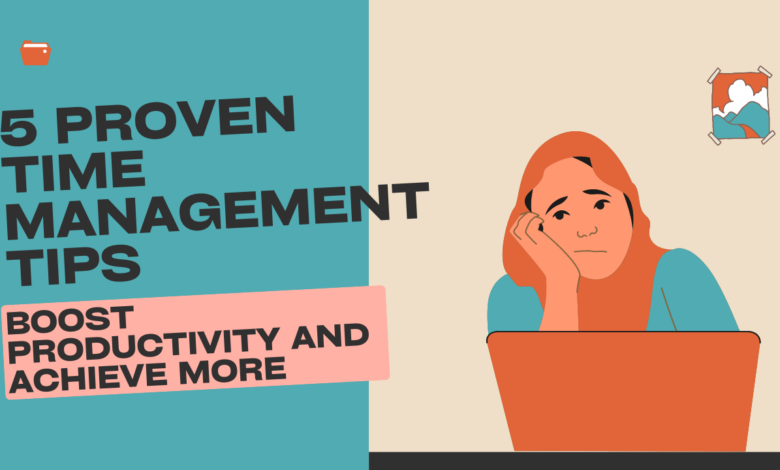5 Proven Time Management Tips to Boost Productivity and Achieve More


In today’s fast-paced world, effective time management is a vital skill that can significantly impact both personal and professional success. Mastering how to manage your time can help you achieve more, reduce stress, and maintain a healthy work-life balance. Whether you’re a student, a working professional, or an entrepreneur, time management is key to reaching your goals. In this article, we’ll discuss proven time management tips to boost your productivity and help you achieve more.
1. Prioritize Your Tasks: Focus on What Truly Matters

One of the most critical aspects of time management is knowing how to prioritize your tasks. With countless distractions and competing demands on your time, it’s easy to get overwhelmed by the number of things you need to accomplish. This is where prioritization comes in. Learning how to distinguish between urgent and important tasks can help you focus on what truly matters and avoid wasting time on less meaningful activities.
A popular method for prioritization is the Eisenhower Matrix, which divides tasks into four categories: urgent and important, important but not urgent, urgent but not important, and neither urgent nor important. By focusing on the first two categories, you can tackle high-priority tasks and avoid being bogged down by busy work. For example, if you’re managing a project, tasks with looming deadlines should be prioritized, while tasks that contribute to long-term goals but lack immediate urgency can be scheduled for later.
Prioritizing tasks also requires flexibility. Life is unpredictable, and sometimes things don’t go as planned. As such, it’s essential to reevaluate your priorities regularly. Having a flexible approach allows you to adapt and make changes when necessary, ensuring that you remain productive and focused even when unexpected events arise.
2. Set Clear, Achievable Goals: The Foundation of Effective Time Management

Without clear goals, managing your time effectively becomes a challenge. Setting specific, measurable, achievable, relevant, and time-bound (SMART) goals can serve as a foundation for better time management. Goals give you direction, focus, and a sense of purpose, making it easier to stay motivated and productive throughout the day.
When you set clear goals, you know exactly what you’re working toward. For example, instead of saying, “I want to get in shape,” a SMART goal would be, “I want to lose 10 pounds in the next three months by exercising three times a week and following a balanced diet.” This kind of specificity makes it easier to allocate your time and resources toward achieving your objectives.
Studies show that writing down your goals can increase the likelihood of achieving them. A study conducted by Dr. Gail Matthews, a psychology professor at Dominican University, found that people who wrote down their goals were 42% more likely to achieve them compared to those who didn’t. This simple habit can keep you accountable and give you a roadmap for success, ultimately helping you manage your time more effectively.
3. Use Time-Blocking Techniques to Structure Your Day
Time-blocking is a powerful time management technique that involves scheduling specific blocks of time for particular tasks or activities. Instead of allowing your day to be dictated by distractions, interruptions, or multitasking, time-blocking enables you to take control of your schedule and allocate focused periods to complete important tasks.
For instance, you might block out two hours in the morning to work on high-priority tasks, followed by an hour for meetings or phone calls, and later in the day, reserve time for less urgent but important activities. This method helps you stay on track, ensures that you make progress on your most critical tasks, and reduces the tendency to procrastinate.
One of the key benefits of time-blocking is its ability to create a sense of urgency. Knowing that you only have a specific window of time to complete a task encourages you to work efficiently and avoid distractions. As Elon Musk, the CEO of Tesla and SpaceX, has stated, “Time-blocking is the secret to my productivity.” By using this technique, Musk can juggle multiple companies and projects while remaining focused and efficient.
4. Avoid Multitasking: How Single-Tasking Can Boost Productivity
While multitasking may seem like an effective way to get more done, studies have shown that it can actually hinder productivity. According to research conducted by Stanford University, people who regularly multitask are less productive than those who focus on one task at a time. Multitasking divides your attention and reduces your ability to focus, leading to lower quality work and increased stress.
Single-tasking, or focusing on one task at a time, allows you to give your full attention to the task at hand. This results in faster completion times and higher-quality work. By immersing yourself in a single task, you can enter a state of deep concentration, also known as “flow,” where you’re fully engaged and performing at your best.
To practice single-tasking, start by turning off distractions. Put away your phone, close unnecessary browser tabs, and set aside specific time blocks for focused work. Additionally, use techniques like the Pomodoro Technique, where you work for 25 minutes, take a short break, and then repeat. This method encourages focused work while allowing time for rest and recovery.
5. Leverage Technology: Best Tools and Apps for Time Management
In today’s digital age, there are countless tools and apps designed to help you manage your time more effectively. Leveraging technology can simplify your time management efforts and help you stay organized and on track.
One of the most popular tools for time management is Trello, a project management app that allows you to organize tasks into boards and lists. Trello’s visual interface makes it easy to prioritize tasks, set deadlines, and track progress. Another great app is Todoist, which helps you create to-do lists, set reminders, and break down larger projects into smaller, manageable tasks.
For those who want to minimize distractions, apps like Forest and Focus@Will are designed to help you stay focused. Forest allows you to grow a virtual tree while you work, which dies if you leave the app, incentivizing you to stay off your phone. Focus@Will provides background music scientifically proven to boost concentration and productivity.
By incorporating these tools into your daily routine, you can streamline your workflow, reduce time wasted on distractions, and enhance your overall productivity. Remember, the goal of technology is to assist you, not overwhelm you, so choose the tools that align with your needs and preferences.
Conclusion
Mastering time management is an ongoing process that requires practice, discipline, and adaptation. By prioritizing tasks, setting clear goals, using time-blocking techniques, focusing on single-tasking, and leveraging the right tools, you can significantly boost your productivity and achieve more in both your personal and professional life. Remember, time is your most valuable resource—use it wisely!




